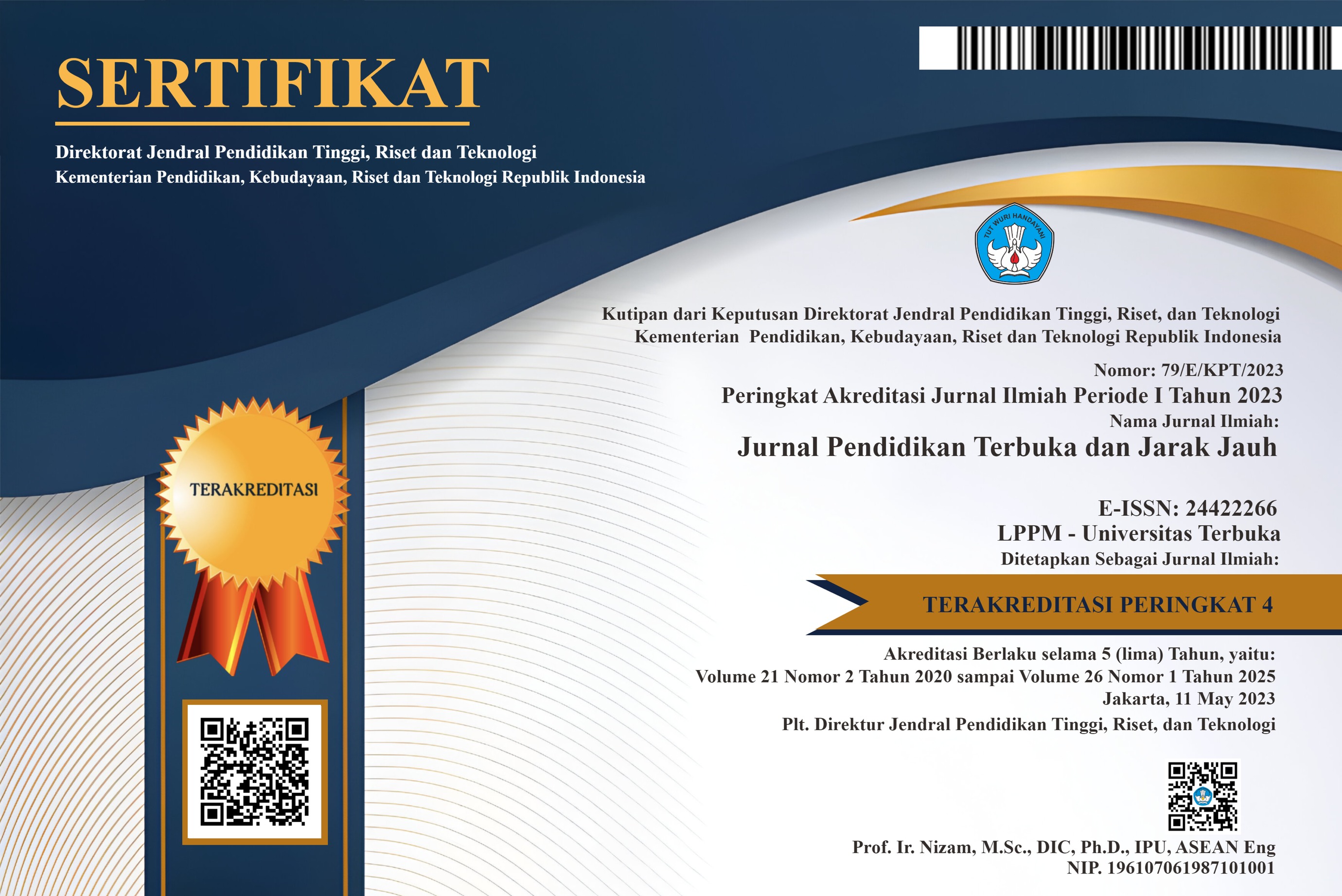ONLINE TUTORIAL FOR ODL STUDENTS: SHARING EXPERIENCE FROM PHILOSOPHY OF SCIENCE COURSE OFFERED AT DEPARTMENT OF EDUCATION - UNIVERSITAS TERBUKA
Keywords:
bantuan belajar mahasiswa, Department of education, Fakultas Keguruan dan Ilmu Pendidikan, filsafat Ilmu, online tutorial, philosophy of science course, student support service, tutotial online, Universitas TerbukaAbstract
Tutorial online (tuton) pada pendidikan jarak jauh seharusnya memungkinkan proses belajar yang asinkronus. Saat ini, sekitar 60% dari seluruh mata kuliah yang ditawarkan di Universitas Terbuka sudah dilengkapi dengan tuton. Tingkat partisipasi pada tuton, yang dicerminkan dari paling tidak ada satu mahasiswa yang registrasi pada tuton mata kuliah tersebut, mencapai 98%. Meskipun demikian, tingginya prosentase ini tidak otomatis mencerminkan tingginya tingkat partisipasi mahasiswa pada aktivitas tuton di mata kuliah. Agar dapat berpartisipasi dalam tuton, mahasiswa disyaratkan untuk melakukan registrasi mata kuliah dan mengaktifkan fasilitas tuton. Dalam artikel ini, dilaporkan hasil analisis terhadap aktivitas mahasiswa pada dua kelas tuton (kelas A dan kelas B) untuk mata kuliah Filsafat Ilmu yang ditawarkan di Fakultas Keguruan dan Ilmu Pendidikan pada semester pertama tahun 2012. Data memperlihatkan bahwa seluruh mahasiswa sudah mengaktifkan tuton tetapi hanya 50% -80% mahasiswa yang aktif dalam tuton. Sementara itu, hanya 60%-75% mahasiswa yang paling tidak pernah satu kali login pada tuton, 30%-48% aktif berdiskusi, dan 20%-72% mengirimkan tugas. Data ini menunjukkan bahwa mahasiswa belum sepenuhnya memanfaatkan tuton. Wawancara dengan peserta tuton memperlihatkan bahwa kesulitan pada koneksi internet dan ketidakbiasaan terhadap sistem yang digunakan merupakan dua kendala utama bagi peserta untuk aktif dalam tuton.
Online tutorial in open and distance learning is supposed to provide asynchronous learning process. At present, around 60% of all courses offered by Universitas Terbuka are complemented with online tutorials. The participation rate for the course complemented with online tutorials which reflected with at least one student login in the online tutorials is high, 95-98%. However, this percentage does not guarantee that participation in the online tutorials is equally high. In order for students to be able to participate in the online tutorials, they have to first register the course and activate the UT online facilities. To analyze student activities in online online tutorials, data from two online tutorial classes in Philosophy of Science online tutorials offered in the first and second semester of 2012 at Department of Education are used. The data showed that all of the students have activated the online tutorials facilities but only 50%-80% of the students were actively engaged in the online tutorials. Furthermore, only 60%-75% students were at least login the online tutorials once in the eight week period, 30%-48% students engaged in discussion, and 40%-72% submitted assignments. This findings show that students have not taken full advantage of the online tutorials. Interviews with the students showed that difficulties in the internet connection and unfamiliarity with the system are two main constrains for student to be actively engage in the online tutorial.
References
Hawkridge, D., Morgan, A., & Jelfs, A. (1997). H801 students' and tutors' use of the electronic workbook and electronic mail, 1997. Report prepared for the Electronic Tutoring Group. Milton Keynes: The Open University Institute of Educational Technology.
Kear, K. & Heap, N. (1999). Technology-supported group work in distance learning. Active Learning, 10, 2126.
Ligorio, M. B., Talamo, A., & Simons, R. (2002). Synchronic tutoring of a virtual community. Mentoring and Tutoring, 10(2), 137-152.
Marjanovic, O. (1999). Learning and teaching in a synchronous collaborative environment. Journal of Computer Assisted Learning, 15(2), 129-138.
Ng, K. C. (2004). Challenges in implementing chat room activities in a distance education course. Article presented at the 21st ICDE World Conference, February 14-18. Hong Kong, PRC.
Richardson, J.T.E. (2009). Face-to-face versus online tutoring support in humanities courses in distance education. Arts and Humanities in Higher Education, 8(1), 6985.
Salmon, G. (2000). E-moderating: The key to teaching and learning online. London: Kogan Page.
Thomas, P. & Carswell, L. (2000). Learning through collaboration in a distributed education environment. Educational Technology and Society, 3, 3. Retrieved online 27/7/12 at http://www.ifets.info/journals/3_3/d12.html





